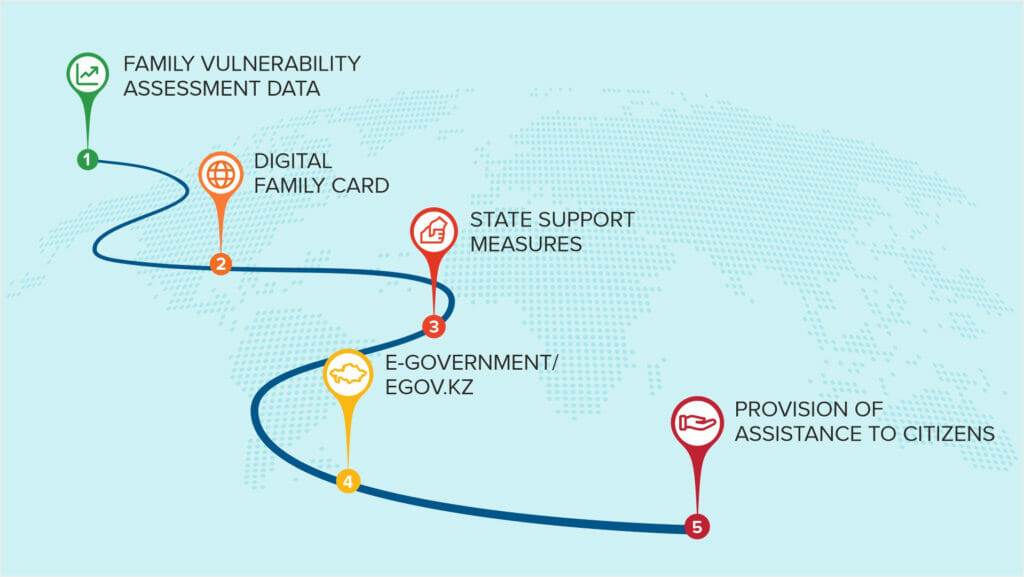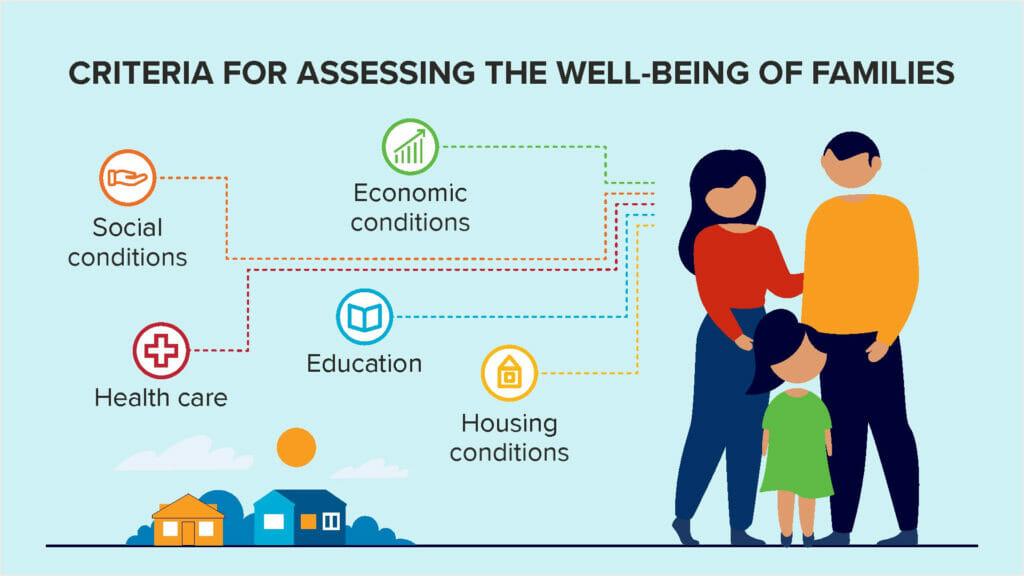Flying nearly under the radar the nation of Kazakhstan, one of Russia’s southern neighbors, has quietly rolled-out a new social assistance program in collaboration with the United Nations Development Programme (UNDP), called the “Digital Family Card (DFC).” While the government scheme was unveiled in 2022 it received next to no conversation in the media, but was briefly reintroduced last week before the UN’s Sustainable Development Goals (SDG) Summit.
The DFC is touted to help achieve SDG #10 Reduced Inequalities, according to Sukhrob Khojimatov, Deputy Resident Representative for the United Nations Development Programme (UNDP) in Kazakhstan.
According to a fact sheet published on February 13th, 2023, titled “Digitalisation for sustainable development and social well-being of society,” explains what the Digital Family Card is and how it works. The UN notes that it is being funded with money courtesy of the UN COVID-19 Response and Recovery Multi-Partner Trust Fund.
As explained by the UN, Digital Family Card is as follows:
The Digital Family Card is unique in that it provides a single point of interaction between government agencies to support the population in areas such as education and social protection, finance, justice and medical and social support, and so on.
After receiving the data with the family vulnerability assessment, the Digital Family Card automatically initiates state support measures, identifies the responsible public authority and through e-gov (‘e-government’) provides the service in proactive mode. Now citizens do not have to go to each of the public services to apply.
The principle of the Digital Family Card is as simple as it can be: the potential recipient of state support is sent a SMS notification to consent to the provision of a public service. If the recipient agrees, a social benefit, payment or other type of support is granted and then credited to their bank account.

The UN reports that around 980,000 of the 5.9 million families living in Kazakhstan have no official income, including pension and social benefits, targeted social assistance, etc.; and 657,300 people out of 127,600 families received targeted social assistance in 2022. Another 3 million are considered to be classified under as a “vulnerable group.”
Most of those filings and documents are done on paper, but the UN and Kazakh government say that the DFC now streamlines these document and payments, providing assistance in real-time rather than waiting and avoiding the headache of filing all the paperwork.
The government, according to the UN, took the liberty of taking all the 5.9 million families in the country were “digitised to assess the well-being of each family.” The UN added, “Next, an in-depth analysis of the areas of health, education, social protection, employment, finance, justice, and agriculture for each family was carried out based on government data sources.”
The government then judged these families based on broad criteria: economic conditions, health care, housing conditions, educational attainment and social conditions. “The problems faced by vulnerable families – lack of housing, education, health insurance, unemployed and underemployed, in need of legal aid and others – are taken as the basis,” the UN went on to explain.

“Each of the five criteria contains information that assesses the vulnerability of a family. A total of 80 socioeconomic indicators are included in the family vulnerability assessment, including: employment for each family member, real estate and commercial property, persons with disabilities in the family, bank loans and debts, and other indicators,” the UN noted.
The findings made it possible to develop and automate the Family Well-being Assessment Methodology. It helps to calculate scores for each family in Kazakhstan cities, regions, districts and villages and to identify the risk zone for each family. Thus, thanks to the Digital Family Card data on the well-being of all families in the country is updated daily.
The UN went on to write
The UN summarizes the project in a short video:
Moreover, on September 17th, one day before the annual UN SDG Summit officially began, Bagdat Mussin, Minister of Digital Development, Innovation and Aerospace Industry of the Republic of Kazakhstan, presented the DFC at the UN headquarters. The presentation received next to no recognition upfront on the UN website, but was buried within an over 6-hour long session of speeches called “SDG Digital“, among a slew of session articles.
Mussin boasted about how the government created a “data lake” comprised of 18 different data points and documentation from their millions of families, which include things like their pensions, taxes, real estate registry, health records, and so forth; that allows the government to procure and retroactively update the DFC.
We can monitor social and economic conditions, home conditions, healthcare, education, and others. […] We are now able to identify family problems that need to be addressed.
Mussin added
The full segment of Mussin’s presentation can be viewed below:
Furthermore, Sukhrob Khojimatov commented on the DFC ahead of the Summit on the 13th, noting that the DFC “improves the efficiency of government agencies, increases the transparency and accountability of budgetary spending, and ensures overall equal access to social protection services.”
The DFC directly supports the most vulnerable groups by providing them with social protection measures, that include social benefits, pension, newborn care payments, among others. It eliminates barriers associated with traditional bureaucratic systems, providing all families, irrespective of their status, location, digital literacy, access to social benefits.
Deputy Resident Representative added, when explaining how this fits in line with the SDGs.
He further noted that the card system could be applied to other fields, too.
[…] The Digital Family Card can be applied not only in the field of social protection, but also in other areas. For example, it could enable local and international development projects to dive deeper into different aspects of education, applying a similar approach to identify the educational needs of students and providing personalized assistance.
AUTHOR COMMENTARY
In other words, this is a proto-social credit score without officially calling a social credit score.
The UN and the Kazakh government of course have to pretty this up, but what they are describing is quite insidious and oppressive. Just fathom it: the government just decided to compile all their citizen’s private data together in a poor, and then from that assigned them a score and is giving residents certain perks and aid. This is a social credit score at it core, that will fit in just nicely with an official digital ID and CBDCs, to track and trace what everyone does and spends, along with mitigating freedoms and personal liberties.
So, when the UN speaks of “reduced inequalities,” now you know clearly what they mean by that.
As a roaring lion, and a ranging bear; so is a wicked ruler over the poor people.
Proverbs 28:15
Things like this and more to come need to be wholly rejected; but we know most people are totally dependent on the system, and will come running at the sound of free money and goodies, and convenience.
[7] Who goeth a warfare any time at his own charges? who planteth a vineyard, and eateth not of the fruit thereof? or who feedeth a flock, and eateth not of the milk of the flock? [8] Say I these things as a man? or saith not the law the same also? [9] For it is written in the law of Moses, Thou shalt not muzzle the mouth of the ox that treadeth out the corn. Doth God take care for oxen? [10] Or saith he it altogether for our sakes? For our sakes, no doubt, this is written: that he that ploweth should plow in hope; and that he that thresheth in hope should be partaker of his hope. (1 Corinthians 9:7-10).
The WinePress needs your support! If God has laid it on your heart to want to contribute, please prayerfully consider donating to this ministry. If you cannot gift a monetary donation, then please donate your fervent prayers to keep this ministry going! Thank you and may God bless you.








Can you say; Total Control over your whole life, never worry again. Thou fools
Great verse Jacob.
They were probably threatened with war on their soil if they did not comply and join.
Hey brother Jacob, just wanted to say thank you for the time and effort that you put into the articles may God bless you and keep you safe.
Thanks, you are welcome!
I can just hear the women talking to their husbands now. Oh but honey, see how much our government cares about us! They want to know every detail about our lives. And they will even help raise our children for us.
Probably.
Why the women?
So thoughts on the connection of social credit score and CBDC to the mark? At what point is it the mark, since this New World Order Beast is acting as ‘god’ over every aspect of life?
We are still a bit a ways away from the mark. People are still holding cash, but that of course is fleeting fast. ‘They’ need digital IDs first, then come the CBDCs on mass scale, but even then I don’t think the mark comes until a little thereafter. The globalists are talking about integrating people into the grid, having smartphones augmented into people, and have AI run the whole thing and keep people connected to it. A lot of chaos and death needs to happen before we get there.
Good old Jesuit Marxism/fascism and ‘indulgent’ ecumenism, Chrislam, combine in fornicating union.
–
The ‘stans’ are all Muslim & stand in the Turkic regions where the Mysteries & serpent worship held great sway, further united through the Greco-influence that came with Alexander the Great, merging and uniting by cunning craftiness, imposition and force. They pride themselves in ‘conservative family values’ while being great hypocrites & persecutors, deeply involved in pedophilia and pederasty as was Mohammed, Joseph Smith etc ….and in the sophistry, imposition & force of jihad & pursuit of world empire through murder & theft like the father they serve. John 8&10 KJB….Zechariah.
–
‘Stan’ means ‘the place of’ or ‘where one stands’, also derivatives of ‘city’ or ‘country’ in Persian and Urdu.
–
(Wrapped up, at least so far as those among them sorted, committed, initiated & sold out highest up and deepest in are concerned: Rome’s cronies: some of the regular folks suffering under that tyranny as it’s being built, might yet be reached with the word of God.)
I am glad to be a visitor of this pure website! , appreciate it for this rare info ! .
We are a group of volunteers and starting a new scheme in our community. Your web site provided us with valuable information to work on. You have done a formidable job and our whole community will be thankful to you.
I have been exploring for a little bit for any high-quality articles or blog posts on this sort of area . Exploring in Yahoo I at last stumbled upon this web site. Reading this information So i am happy to convey that I have a very good uncanny feeling I discovered just what I needed. I most certainly will make certain to do not forget this web site and give it a look regularly.
Excellent post. I was checking continuously this blog and I am impressed! Very helpful information specifically the last part 🙂 I care for such information much. I was seeking this certain info for a very long time. Thank you and best of luck.